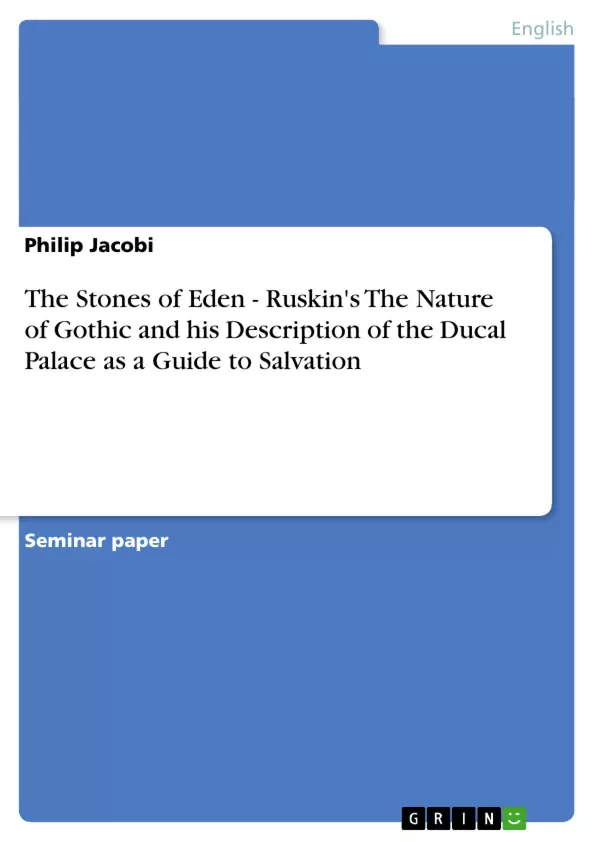John Ruskin was by no doubt the most prominent art critic of the 19th century. His works on art, architecture and, at the height of his career, social problems sparked the Arts and Crafts Movement, enlightened prominent figures, such as William Morris, and proposed a critical point of view on modern life.
[…] he clearly understood himself as a universal critic who, in an age of rapidly advancing differentiation and growing doubts, endeavoured to heighten the public awareness of the relation between artistic performance and social improvement […] (Kamm 2002: 9)
´This paper tries to analyse how Ruskin, through his description of the Ducal Palace in Venice, evokes a vision of a ‘Paradise for the Worker’ by instituting The Nature of Gothic as a ‘dictionary’ to an implicit “architext” (Kamm 2002: 6) in John Ruskin’s work on architecture and if he succeeds.
Inhaltsverzeichnis (Table of Contents)
- Introduction
- John Ruskin
- Ruskin and Venice
- Ruskin and Great Britain
- The 'Architext'
- The Ducal Palace
- The Gothic in the Ducal Palace
- Savageness
- Changefulness
- Naturalism
- Grotesqueness
- Rigidity
- Redundance
- The Architext of the Ducal Palace
- Rudeness
- Love of Change
- Love of Nature
- Disturbed Imagination
- Obstinacy
- Generosity
- Religious Imagery in the Ducal Palace
- The Gothic in the Ducal Palace
Zielsetzung und Themenschwerpunkte (Objectives and Key Themes)
This paper explores John Ruskin's perspective on the Ducal Palace in Venice, examining how his description of this architectural marvel evokes a vision of a 'Paradise for the Worker'. The paper delves into Ruskin's concept of 'The Nature of Gothic' as a 'dictionary' for interpreting the 'architext' of the Ducal Palace.
- The influence of Venice and Great Britain on Ruskin's work.
- The concept of 'The Nature of Gothic' as a framework for understanding architecture.
- The Ducal Palace as a symbolic representation of a 'Paradise for the Worker'.
- The critique of modern industrial society and its impact on the working class.
- The role of architecture in promoting social improvement and moral salvation.
Zusammenfassung der Kapitel (Chapter Summaries)
- Introduction: This chapter introduces John Ruskin as a prominent art critic of the 19th century and outlines the paper's focus on his analysis of the Ducal Palace in Venice. It highlights Ruskin's goal of establishing a link between artistic expression and social progress.
- John Ruskin: This chapter explores Ruskin's relationship with Venice and Great Britain. It delves into his feelings of nostalgia towards Venice and his critique of the modern British workforce. It also touches upon his religious background and his evolving views on faith.
- The 'Architext': This chapter introduces the concept of the 'architext', arguing that architecture, like poetry, possesses a semiotic system that generates meaning. Ruskin's interpretation of architecture is influenced by his experiences in Venice and his concerns about the state of British society.
- The Ducal Palace: This chapter delves into Ruskin's analysis of the Ducal Palace, examining how it embodies the principles of 'The Nature of Gothic'. It explores how the palace reflects Ruskin's vision of a harmonious society where art and social improvement are intertwined.
Schlüsselwörter (Keywords)
This paper explores key concepts like John Ruskin, The Nature of Gothic, architext, Ducal Palace, Venice, social improvement, industrial society, and moral salvation. It examines Ruskin's critical perspective on art and architecture, his critique of modern British society, and his belief in the power of art to shape social and moral values.
Frequently Asked Questions
Who was John Ruskin and why is he significant?
John Ruskin was a prominent 19th-century art critic whose work linked artistic performance with social improvement and influenced the Arts and Crafts Movement.
What is Ruskin's 'The Nature of Gothic'?
It is a conceptual framework or 'dictionary' used by Ruskin to interpret the moral and social meanings embedded in Gothic architecture.
How does Ruskin describe the Ducal Palace in Venice?
Ruskin views the Ducal Palace as a symbolic 'Paradise for the Worker,' where the architecture reflects a harmonious relationship between art and society.
What are the six characteristics of Gothic architecture according to Ruskin?
Ruskin identifies Savageness, Changefulness, Naturalism, Grotesqueness, Rigidity, and Redundance as key elements of the Gothic style.
What is the 'architext' in Ruskin's work?
The 'architext' refers to the semiotic system of architecture that generates meaning, similar to how poetry functions in literature.
How did Ruskin's religious background affect his views on architecture?
His religious upbringing heavily influenced his belief that architecture should promote moral salvation and reflect divine nature.
- Citation du texte
- Philip Jacobi (Auteur), 2004, The Stones of Eden - Ruskin's The Nature of Gothic and his Description of the Ducal Palace as a Guide to Salvation, Munich, GRIN Verlag, https://www.grin.com/document/33151



